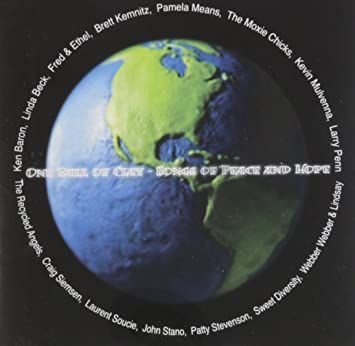This 16-song collection was assembled in the wake of the events of September 11th and features the contributions of folkies from Milwaukee, Wisconsin. Milwaukee is primarily known for beer and its poor sports teams, but, as the liner notes say, it also “has a vibrant folk music community”. Some of the songs here were written as a direct result of 9-11 while others were written prior to it. And the album’s title says it all.
The sentiment behind the songs is irreproachable but I found most of them to be pretty boring. I do not question the sympathies of the musicians themselves but the music seems to have come from the blueprint used by every wanna-be folkie that populates coffee shops around the country. Everyone seemed to be technically competent but I kept asking myself why it was that hardly any of the artists here could come up with an interesting melody or put some fun into the music.
The album starts off with Linda Beck’s “La Tierra Misma (The Same Ball of Clay).” Some gentle guitar picking is joined by her delicate voice – in Spanish. As the song continues, she begins to alternate singing in English and Spanish and is joined by a chorus of children. It kind of reminds me of Iris DeMent in its homespun quality but it fails to really have an impact. Ken Baron’s jazz-inflected “Why Can’t Man Make Peace?” is almost catchy.
Kevin Mulvenna contributed “Never Again,” which has some nice percussion by Marcos Castañeda and I like the way the narrative shifted to different people as it describes the effects of war. It’s not a bad song and Mulvenna puts some balls into his vocals. The next song, “Peace Light,” is probably my favorite on the album. It’s a jaunty tune with great vocal harmonizing by the women of The Recycled Angels.
Patty Stevenson and Pamela Means each give performances consisting of just voice and a lone instrument. While I like the intimacy of these songs, the music was unspectacular. However, I must admit that Means sings with a great deal of passion. She has a wonderful voice and wraps her almost sultry voice around the words.
John Stano’s “Be All You Can Be” injects some humor into the proceedings. Very much in the vein of Freewheelin’ era Dylan he employs just guitar and kazoo for accompaniment. The song’s title refers to the U.S. Army’s recruitment campaign slogan and Stano really bends the thing to his will. It’s a fun, sarcastic song. Following it is Laurent Soucie’s “Wall to the Sea.” It gallops along at a fairly brisk pace and features some nice penny whistle breaks. Fred & Ethel’s “Babies” is a quirky, up-tempo song with some piercing electric guitar to complement its relentless, almost mechanical beat.
About a quarter of the songs here are worth repeated listens. Most of the worthwhile tunes here are that way because of good melodies and a performer willing to put an individual stamp on the song - a kazoo, some humor, et al – and make it distinctive. Unfortunately, most of the music here comes across as being very generic.
While it is probably a good introduction to the folk scene in Milwaukee, it just can’t stand on its own.
(This was originally published at The Green Man Review back in 2003-04.)

No comments:
Post a Comment